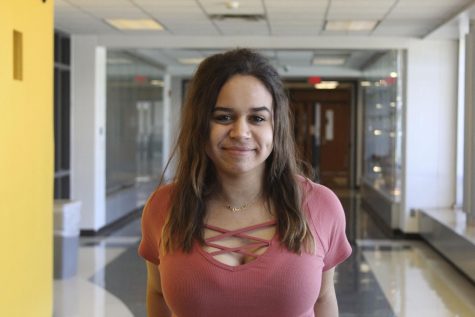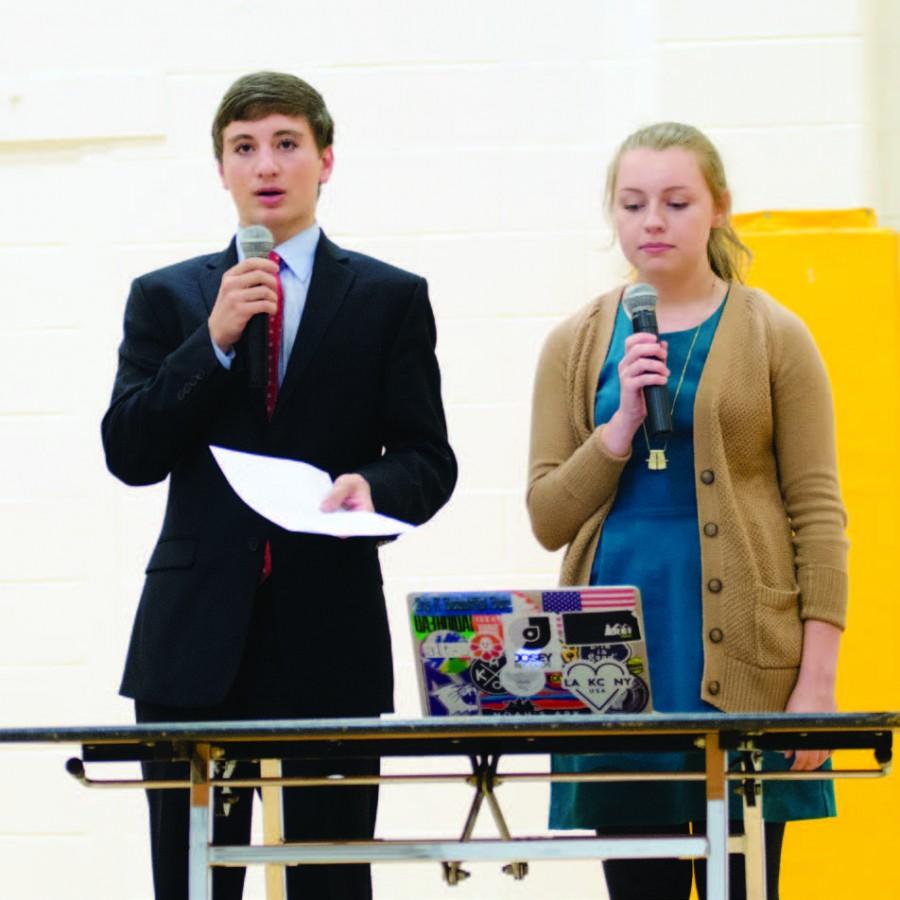The Deal with Debate
Senior Amanda Miller cross-examines sophomore Louis Pires at the Fine Arts Potpourri. Each year, debate students perform a mock debate at this event. “Debate creates a community of learning that is beyond what we get at school,” Miller said. “It encourages us to be more aware of what is going on in the world and to discuss it.” Photo by Maddie Davis.
Spending an hour and a half arguing about domestic surveillance, cracking political jokes left and right and constructing an entire speech in a matter of minutes makes debate unlike any other activity.
Despite the stereotypes and assumptions, debate isn’t actually just arguing about random topics. It’s also not all about learning one side — every debater must be prepared to take on either position of the argument. They stand as the affirmative — agreeing with the resolution — or the negative — disagreeing with it.
“I always liken it: what a martial art is to fighting, debate is to arguing,” debate coach Chris Riffer said. “So, yes, there’s an arguing element to it, but you’re doing it in a disciplined manner. We learn about claims, warrants, data, impacts, counterclaims and things like that.”
Each year, debate coaches across the country vote on one topic — which is called the resolution — they wish to see argued during the next season. The resolution this year concerns curtailing domestic surveillance.
Freshman Nick Clark said this year’s topic interests him and has taught him quite a bit.
“I’ve always known this existed, but I never really got in-depth on it,” he said. “I didn’t really know how much they were actually doing.”
From metadata to drones to encryption, there are a multitude of cases being run this year, each offering new and detailed information about the federal government’s surveillance techniques.
Riffer said this year’s topic is amazing because of its relevance and real-life impact on teens.
“[Students] learn about the power and reach of the government and just how much power and reach the government should have,” he said. “I think those are critical questions we don’t ask enough — especially teenagers — so I think it’s a great thing for them to learn.”
Despite what many may believe is just an academic activity filled with busy work and lectures, junior Karishma Shah said there is a family-like atmosphere throughout the debate team.
“We’re very, very close,” Shah said. “We hang out a lot outside of class. We’re really good friends, and we all look out for each other.”
Even though Blue Valley has a large team — 150 debaters in total, 55 of whom are novice — Clark said his favorite part of being in debate was meeting new people.
“At the debates, I meet a lot of different people from different schools,” he said. “I’ve made a lot of new friends this year.”
Riffer said the most interesting part of teaching debate is seeing his students’ minds change.
“I think my favorite thing is the critical thinking skills kids get — watching their brains expand in a way that school sometimes just doesn’t do a good enough job of expanding them, [like] how to problem solve and analyze situations,” he said.
The season has been full of success, Riffer said, but Shah said her highlight was placing fifth in a tournament on Oct. 30-31.
“I’ve been [debate partners] with my best friend — it’s a lot of fun no matter how we do at a tournament,” Shah said. “We did well [recently]. We went 4-1, which would bring us to fifth place out of 60 or 70 teams, which was great.”
While this season has been successful, Riffer said he’s excited for the talented debaters returning next year.
“There’s just this massive tidal wave of really talented juniors and sophomores that will be seniors and juniors next year,” he said. “We’ve done amazing this year, but it’s going to be even more amazing next year.”

Julie is the co-editor in chief of "The Tiger Print" and has been on staff for three years. She writes features, news and opinion stories and also takes...




